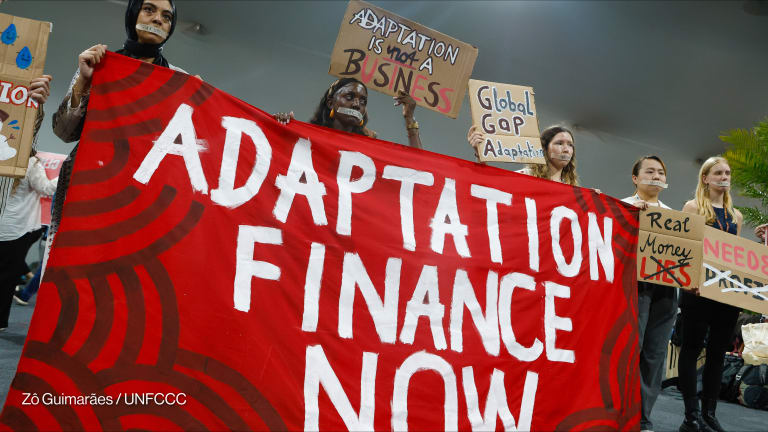How to succeed as a climate officer
As more thematically broad NGOs hire in-house climate officers, how can those who take up the positions succeed in driving institutional and even sectorwide change? Devex asks the experts.
Last year, the likes of Pact, USAID, and the Commonwealth Secretariat advertised for climate change or environment officers despite their remit not exclusively being on the topic. “It’s a burgeoning area,” said David Bonnardeaux, director of environment, climate and energy at Pact, a nonprofit that focuses on ending poverty. Such roles are becoming commonplace in NGOs, regardless of their thematic area, as more organizations look to green their operations and recognize the cross-cutting nature of climate change. Similar positions have been advertised in the private sector for many years, but “it’s a relatively new concept in the development space,” said David Nicholson, who took up the newly created role of chief climate officer at Mercy Corps 18 months ago. His remit includes realizing the organization’s commitment to environmental sustainability and increasing its overall understanding of climate issues. Similar advertised positions describe the role as “coordinating,” “liaising,” and “communicating” both internally and externally on climate projects, policy, and advocacy, oftentimes leading on the implementation of an organizational climate strategy that will see its operations become more climate-friendly. A degree in climate change or environmental science is typically listed as a requirement alongside experience in climate finance or environmental governance. But what are the challenges of taking on a role in an organization not solely focused on climate change, what experience is most relevant, and how can an individual succeed as a climate officer? Devex asked those who have occupied the role. Drive institutional change Whether it be ensuring operations don’t damage the environment or analyzing how climate is impacting an NGO’s projects, a climate officer’s position typically requires taking a whole-of-organization approach rather than running a few initiatives that show results, said Nicholson. “The job really is about institutional change,” he said, which he thinks was influential in Mercy Corps placing his role on the leadership team in order to integrate it across the NGO. Much of Nicholson’s day-to-day activities involve internal advocacy meetings and working with different departments. “My small team brings in outside experts to host webinars or discussions with various parts of our country teams to see where there's really positive action we want to pull forward, and then [we] advocate” for policy changes and resources “to the executive team on a really regular basis,” he shared. For Nafkote Dabi, Oxfam International's climate change policy lead, her role goes beyond Oxfam to influencing multilateral processes at regional and global levels. She looks at events such as the United Nations General Assembly and considers what change needs to be advocated for. “[We] collaborate with allies to raise a specific profile of the crisis and … demand our ask, whether it's a policy-related ask or as simple as putting that issue in the mind of the public,” she shared. This means she has to collaborate “internally with various Oxfam climate justice colleagues and then externally with a lot of allies.” Given this focus on institutional change, Jamella Chesney, who works on a consultancy basis as a climate policy officer in Guyana and has held roles with The Commonwealth Secretariat and Green Climate Fund, believes an understanding of how negotiations work will go a long way in such a role. “You negotiate on a day-to-day level if you work with different people,” she shared. Learn from others, no matter their sector With few climate officers within the development space to turn to when Nicholson transitioned into his role, he approached those in the private sector “just to get a sense of how those roles … play out.” This, he said, was useful in that one officer shared their take on the role of risk management against climate change. “I was inspired by that idea but took it further, thinking this is really changing the DNA of an organization and really embracing the reason we exist to some significant degree,” Nicholson said. Building such relationships both within and beyond the immediate sector is vital as partnerships are essential, said Chesney. “You find that many people are working toward the same thing, but they’re not talking to each other,” she said, adding that having an exchange of knowledge can go a long way. “Don’t feel isolated in the struggles you’re facing. Try to bridge the communication gap.” Bonnardeaux, whose team focuses on implementing climate mitigation, adaptation and resilience projects at Pact, as well as greening supply chains and reducing the organizations’ emissions, shared that he joined the World Resources Institute’s sustainability managers roundtable. This provides a space to learn from similar organizations working to reduce their emissions on a budget, he said, adding that the various Conference of the Parties, such as COP 28, can also allow a person to better understand how an officer can be “relevant and play a value-added role in the system rather than being another cog competing for more market share.” Go beyond climate change Often mentioned in job adverts for climate officers, Oxfam’s Dabi said it is useful for a climate officer to have a policy and research background. “Having a research background will help you get information and use your analytical skills to identify priorities. Not only priorities but how you can be strategic,” she said, adding that this feeds into policy creation, be it internal or sectorwide. It will make it easier if a person can understand the different mechanisms within government, private sector, or civil society organizations, added Dabi, whose background is in advocacy for food security, conflict, and migration. “People really forget that working on climate is almost like working on politics,” she said. For Bonnardeaux, who began with Pact as senior technical officer nine years ago before the climate team grew and he took on his current more senior role, being able to speak the private sector language around key performance indicators, for example, is valuable given their increasing presence in the climate space. “Having an understanding of the carbon market but also how to work with the private sector to catalyze their financing is an important one,” he said, adding that in new hires, he also looks for knowledge in carbon accounting. But even as a self-described jack-of-all-trades, Bonnardeaux acknowledged that having specialty skills has its benefits. “I’d say focus your efforts on mitigation or adaptation, the private sector or nature-based solutions if you have that luxury because it will make your life easier; not feeling like you’re putting out fires,” he said. Hone certain soft skills “The climate crisis leads to people putting their head in the sand a lot … so being able to help leaders keep their eyes open and think about this as a change process is really hard work,” Mercy Corps’ Nicholson said, making the ability to communicate clearly and to set a clear strategy with specific workstreams important. For Chesney, who has a background in climate change policy and environmental science, storytelling plays an integral role “because people won’t care or be invested until they understand how this issue directly affects them,” she said. At Oxfam, Dabi shared that she had seen colleagues doing amazing work in climate officer roles because of media experience and an understanding of the story that needed to be told. “Ultimately, we need the backing of the public to influence,” she said. Patience and passion, Nicholson said, are also crucial. “Change can be slow. You have to be quite deliberate, so you need to be willing to make compromises and work with people and be patient as change happens.” Dabi agreed that without a passion for protecting the environment, the work can be hard. “If you have a bit of knowledge on climate and, more than anything, an interest to fight and bring about change on climate, anyone can do this job,” she said. Ready to stand out from the crowd and get noticed by the recruiters who matter most? Update your Devex profile and start connecting with top global development recruiters now.
Last year, the likes of Pact, USAID, and the Commonwealth Secretariat advertised for climate change or environment officers despite their remit not exclusively being on the topic.
“It’s a burgeoning area,” said David Bonnardeaux, director of environment, climate and energy at Pact, a nonprofit that focuses on ending poverty. Such roles are becoming commonplace in NGOs, regardless of their thematic area, as more organizations look to green their operations and recognize the cross-cutting nature of climate change.
Similar positions have been advertised in the private sector for many years, but “it’s a relatively new concept in the development space,” said David Nicholson, who took up the newly created role of chief climate officer at Mercy Corps 18 months ago. His remit includes realizing the organization’s commitment to environmental sustainability and increasing its overall understanding of climate issues.
This article is exclusively for Career Account members.
Unlock this article now with a 15-day free trial of a Devex Career Account. With a Career Account subscription you will get:
- Full access to our jobs board, including over 1,000 exclusive jobs
- Your Devex profile highlighted in recruiter search results
- Connections to recruiters and industry experts through online and live Devex events
Start my 15-day free trialAlready a user?
Printing articles to share with others is a breach of our terms and conditions and copyright policy. Please use the sharing options on the left side of the article. Devex Pro members may share up to 10 articles per month using the Pro share tool ( ).
Rebecca L. Root is a freelance reporter for Devex based in Bangkok. Previously senior associate & reporter, she produced news stories, video, and podcasts as well as partnership content. She has a background in finance, travel, and global development journalism and has written for a variety of publications while living and working in Bangkok, New York, London, and Barcelona.








